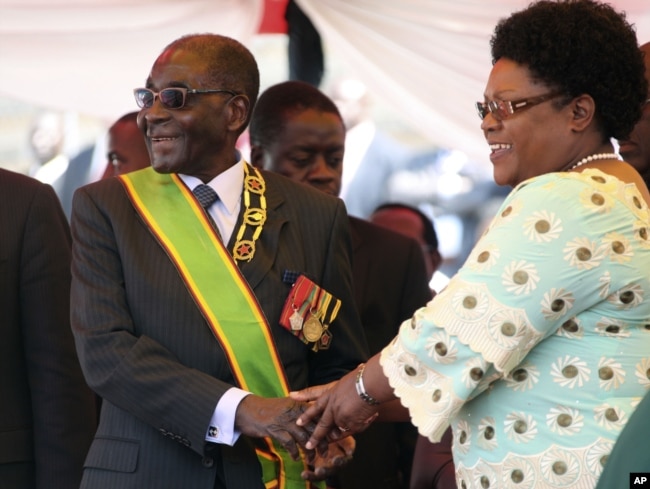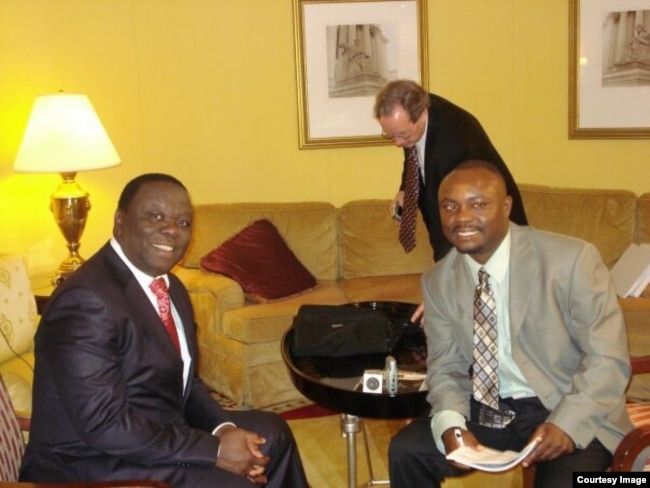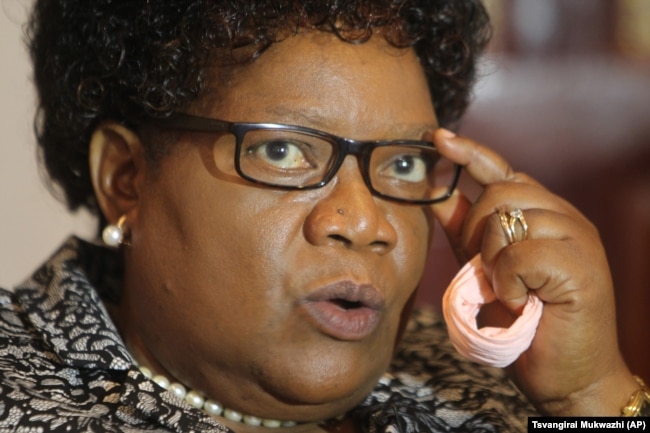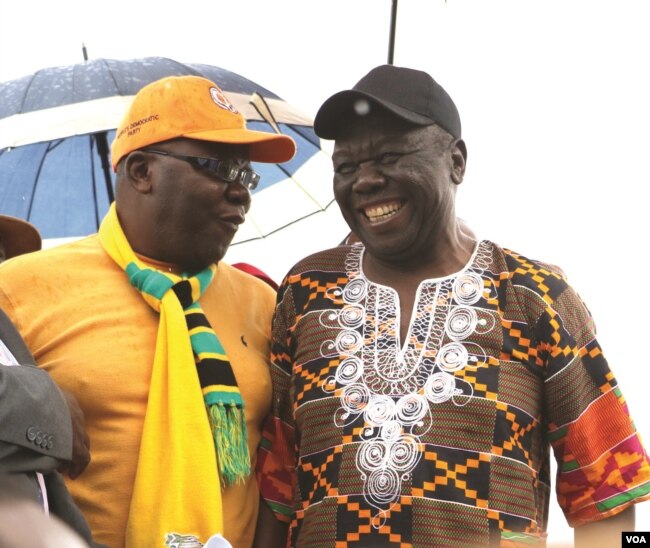Zimbabwe has more than 50 registered political parties, several of which have set their eyes on the grand prize of the presidency in 2018. But if sentiments by analysts or even the country’s president are anything to go by, individually or as a coalition, the opposition parties are no match against him or his revolutionary and incumbent Zanu-PF party, fractured as it is by alleged factionalism.
by Blessing Zulu
President Robert Mugabe, the world’s oldest president at 93, has already declared victory in the upcoming 2018 elections, saying the public “feel that there is no replacement, successor who to them is acceptable, as acceptable as I am.”
In President Mugabe’s view, the only threat to him or Zanu-PF clinching the 2018 elections, is not the opposition, which he has often chided, but the “quarrels with the party, suspicions with the party,” which he assured they are “remedying.” But despite the “quarrels” and “suspicions”, which include factionalism allegations involving one of his vice presidents, Emmerson Mnangagwa and his wife, Grace, Zanu-PF has remained largely intact over the years, compared to opposition parties.
One characterization President Mugabe has made of the nature of opposition parties, can be summed up by his reference to the Zimbabwe People First (ZimFirst) – the party of his former Vice President Joyce Mujuru, where he said, “it’s born in the morning and before sunset, it has become something else.”
Soon after Mr. Mugabe’s prediction, Mujuru did split from the less than two-year-old ZimFirst Party and started a new party called the National People’s Party (NPP).

FILE: President Mugabe with former Vice President Joice Mujuru.
Such has been the fate of political parties, including the once formidable and very strong and unified opposition Movement for Democratic Change then led Morgan Tsvangirai, which, even by Mugabe’s admission, won the 2008 presidential election, but agreed to a power-sharing agreement that analysts say, diminished its luster.
The once unified MDC-party is now fractured, and the mother of several offspring opposition parties led by former senior members including Tendai Biti, Professor Welshman Ncube, Elton Mangoma and Priscilla Misihairabwi-Mushonga, while Tsvangirai still leads what is now abbreviated as MDC-T.
As the 2018 elections draw close, the opposition parties are debating forming a grand coalition to challenge the aging leader’s 37-year reign, saying he is no longer fit to run the country. President Mugabe has scoffed this effort saying his party is not afraid as the opposition’s coalition will “just amount to a huge pile of zero. Nothing.”
Stephen Chan, Professor of World Politics at the University of London agrees that it will take more than a coalition of opposition parties to defeat President Mugabe in the 2018 elections, and also believes that Mugabe and his party will remedy all conflict before the elections and stand as a united front.
“Succession battles will not hinder Zanu (PF) from taking the country forward since the party has a strong internal disciplinary machinery to take care of the squabbles,” said Chan, pointing out that there would eventually be a smooth, though not imminent, Zanu (PF) succession.
IS ZIMBABWE’S OPPOSITION WEAK?
As Mugabe’s exit from Zimbabwe politics becomes more imminent either voluntary due to his incapacity to lead due to age or an unlikely move by Zanu-PF to ask him to step down, as Mr. Mugabe said he will do if asked, questions about the opposition’s ability to successfully take over, continue to fester.
Independent analyst David Monyae agrees with Mr. Mugabe on the fact that a grand coalition alone won’t dent Zanu-PF’s chances in 2018, because the opposition lack unity and strong leadership.
“At the moment the opposition don’t have a strong figure, individual,” Monyae said, remarking further on whether the leadership will be “the same of the same, having [Morgan] Tsvangirai or having [Joice] Mujuru, and one is not clear in terms of a coalition, under the banner of which leader?” queried Monyae, concluding that “the opposition is not clear. It’s a 50-50, one does not really know.”
Monyae’s observation reflects what analysts have described as the selfish and ego-struck nature of many opposition leaders, who’s splits have been mostly rooted in power struggles, rather than divergence of strategy on how to defeat Mugabe and address the plight of Zimbabwe’s citizens.
Agreeing that there is a power-play in opposition politics over leadership, analyst Chipo Dendere of Gettysburg College in Pennsylvania, sees Tsvangirai as the coalition’s obvious choice, given his popularity among citizens, with the title fight falling on the position of vice president. Dendere said if the coalition could settle on a strong leader, and execute a thoughtful strategy, they could maybe defeat Mugabe.
“I think Tsvangirai has the upper-hand to be the presidential candidate, and then, then they think about who’s vice president,” lamented Dendere before throwing out a few suggestions. “I don’t know if Welshman [Ncube] should be the vice president, I don’t know if mai [Joice] Mujuru should be the vice president, I don’t know if Tendai Biti should be the vice president, (inaudible?) Maybe Thoko, [MDC-T VP] Thokozani Khupe. I don’t know how they can decide who will be the vice president,” Dendere said.

file: Opposition leader Morgan Tsvangirai and VOA Studio 7’s Blessing Zulu. (Courtesy Image)
Strategy, stressed Dendere will also help the opposition parties leverage on their strongholds in parliamentary elections as well as the presidential elections, ensuring strength in numbers where it counts. Dandere elaborates.
“They eventually have to look at the electoral map and say, if someone from the coalitions is stronger for a particular district, then that person should run in that district. So that’s how that coalition should work,” Dendere expounded.
“So, Mai Mujuru should run for Mt. Darwin, right. Someone from MDC-T or MDC-W, should not run for that seat. That seat should be run by Mai Mujuru because she’s stronger. So its going to be a matter of looking at each of the 300 candidates, because they need 300 candidates for senate and parliament, about 300, right, including the women, the proportional representation of women, so they need to create a coalition of 300 candidates and make sure that each person who is running for each district, is the strongest.”
THE OPPOSITION’S PERSPECTIVE
Ask any of the opposition parties currently in existence and you will hear unanimity on the fact that President Mugabe must now leave the stage, citing age and failure to improve lives of ordinary citizens. All dispute and dismiss the perception that they are weak, turning the tables instead on Mr. Mugabe and his party, which they accuse of infiltrating their parties in efforts to destroy them from within.
Spokesperson Douglas Mwonzora of the Tsvangirai-led MDC party challenges Mr. Mugabe’s and other analyst’s assertions that they are politically weak, by reminding them of their 2008 presidential victory.
“He has amnesia, terrible amnesia,” said Mwonzora. “He has forgotten that he lost to MDC in 2008, and so he cannot say that we always lose to Zanu-PF. He lost to Morgan Tsvangirai and orchestrated an orgy of violence,” Mwonzora continued.
Further, added Mwonzora, while the MDC-has seen some monumental splits and internal disagreements since its formation in 1999, Mwonzora said Zanu-PF is no exception.
“The disunity within the opposition political parties is not a phenomenon of the MDC. It’s actually a phenomenon of Zanu-PF,” Mwonzora reflected. “It was Zapu, then it split into Zapu and Zanu. Then we had Frolizi (Front for the Liberation of Zimbabwe), then we had (inaudible?) After that we also had ZUM (Zimbabwe Unity Movement) coming from Zanu-PF … ZUD [Zimbabwe Union of Democrats] from Margaret Dongo from Zanu-PF, Mujuru’s Zimbabwe People First coming from Zanu-PF, and right now we have two distinct, irreconcilable groups, G40 and Lacoste, within Zanu-PF. He is presiding over the most divided party on the African continent,” said Mwonzora.

Joice Mujuru
The newly formed National People’s Party of former Vice President Joice Mujuru boasts of having an inside knowledge of the workings of Zanu-PF, that will help the party overcome the fate of fellow opposition parties and leaders. Jelousy Mawarire is the NPP’s spokesperson.
“We are a party that has a very significant number of ex-Zanu-PF members, ex-military people, ex-intelligence people, who are in our party,” Mawarire said. “So they know the modus operandi of Zanu-PF and Mugabe, and we will never be fooled that Zanu-PF does not infiltrate opposition political parties. That’s a lie, and it a lie that’s supposed to lull opposition parties so that they become too comfortable and not very vigilant to fish out infiltrators from among themselves,” said Mawarire.
Opposition leader Tendai Biti who now heads the People’s Democratic Party, which is an offshoot of MDC-Renewal, another splinter of the Movement Democratic Party where he once served as secretary general, too disagrees that opposition parties are weak, accusing Zanu-PF instead of stifling their growth.
“The opposition is not weak,” said Biti, and accused Zanu-PF stealing the opposition’s electoral victory. “The opposition has been winning elections since 2000. Zanu-PF, for all intent and purposes does not exist. it exists because it controls the state, and the state and the party, Zanu-PF have conflated. So we live in a party state,” concluded Biti.
Biti, who in a 2015 interview with the online paper Bulawayo 24 described the opposition as “a disaster,” “impotent, divisive, divided and hubristic,” is pushing for a coalition of opposition parties, which would include his former boss, Tsvangirai, who Biti has openly accused of among other things, failing to lead.
Despite President Mugabe and other analysts dismissal of a coalition of opposition parties to stand against Zanu-PF in 2018, Biti said that is the way to go for opposition parties.
“What the opposition has to do and we have no excuse for not doing that, is that we have to form a grand coalition and of course…steps have started. Some of us are members of CODE, the coalition for democrats, and others are in electoral alliance known as NERA, the National Electorate Reform Agenda. So I think that leaders of NERA, leaders of CODE, must move very quickly to form a grand coalition so that we can shame this shameless old man,” Biti said.

Former Prime Minister Morgan Tsvangirai shares a joke with his former finance minister, Tendai Biti, at a rally of about 500 people in Harare, March 22, 2017. Tsvangirai said the next election is heading for a dispute.
Whether or not the opposition is weak, based on Mr. Mugabe’s assertions and that of analysts, political analysts David Monyae says there current situation is a no-win situation for Zimbabwe no-one is addressing the fundamental issues bedeviling the country.
“There is no doubt that the opposition in Zimbabwe is weak, so he is. He is also weak himself. So it’s a question of having a fragmented opposition and having an aging leader, with a fairly good party, however, the lack of succession in his own party weakens the very same party that the fragmentation within the opposition might end up with a great potential of fragmentation within Zanu-PF.”
Monyae cautions against dragging out debate over who is in a better position, despite their clear faults, saying the country is declining at a rate that will take longer to fix.
“The period of decay is getting much, much longer. No one expected that Mugabe would reach this stage as a head of state. He’s the oldest in the world, and there is absolutely no need for him to continue, there is no point that he is making to anyone. But there is an urgent need to deal with succession issues within Zanu-PF and to pave way for easing of sanctions, as well as to ensure that the easing of sanctions as well as to ensure that the country operates like all other African countries.”
Political analysts and economists are warning that Zimbabwe risks becoming a failed state as the country faces multiple social and economic problems, spawned by endemic governance failures and compounded by a debilitating ruling party succession crisis. Critics say the crisis has been worsened by the country’s fractured opposition parties that have dismally failed to provided leadership and a viable alternative.-VOA






